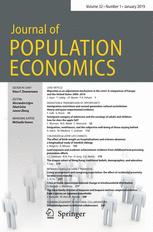Does schooling attenuates the genetic predisposition to poor mental health. The GLO Discussion Paper of the Month of June 2019 provides some empirical support, but the findings are not robust.
GLO Discussion Papers are research and policy papers of the GLO Network which are widely circulated to encourage discussion. Provided in cooperation with EconStor, a service of the ZBW – Leibniz Information Centre for Economics, GLO Discussion Papers are among others listed in RePEc (see IDEAS, EconPapers). Complete list of all GLO DPs downloadable for free.
GLO Discussion Paper of the Month: June
GLO Discussion Paper No. 362, 2019
Mental Health, Schooling Attainment and Polygenic Scores: Are There Significant Gene-Environment Associations? – Download PDF
by Amin, Vikesh & Behrman, Jere R. & Fletcher, Jason M. & Flores, Carlos A. & Flores-Lagunes, Alfonso & Kohler, Hans-Peter
GLO Fellows Jere Behrman, Carlos Flores and Alfonso Flores – Lagunes
Author Abstract: It is well-established that (1) there is a large genetic component to mental health, and (2) higher schooling attainment is associated with better mental health. Given these two observations, we test the hypothesis that schooling may attenuate the genetic predisposition to poor mental health. Specifically, we estimate associations between a polygenic score (PGS) for depressive symptoms, schooling attainment and gene-environment (GxE) interactions with mental health (depressive symptoms and depression), in two distinct United States datasets at different adult ages- 29 years old in the National Longitudinal Study of Adolescent Health (Add Health) and 54 years old in the Wisconsin Longitudinal Study (WLS). OLS results indicate that the association of the PGS with mental health is similar in Add Health and the WLS, but the association of schooling attainment is much larger in Add Health than in the WLS. There is some suggestive evidence that the association of the PGS with mental health is lower for more-schooled older individuals in the WLS, but there is no evidence of any significant GxE associations in Add Health. Quantile regression estimates also show that in the WLS the GxE associations are statistically significant only in the upper parts of the conditional depressive symptoms score distribution. We assess the robustness of the OLS results to omitted variable bias by using the siblings samples in both datasets to estimate sibling fixed-effect regressions. The sibling fixed-effect results must be qualified, in part due to low statistical power. However, the sibling fixed-effect estimates show that college education is associated with fewer depressive symptoms in both datasets.
GLO Discussion Papers of June 2019
364 Hate at first sight? Dynamic aspects of the electoral impact of migration: The case of Ukip – Download PDF
by Levi, Eugenio & Mariani, Rama Dasi & Patriarca, Fabrizio
363 The Gender Pay Gap in the US: A Matching Study – Download PDF
by Meara, Katie & Pastore, Francesco & Webster, Allan
362 Mental Health, Schooling Attainment and Polygenic Scores: Are There Significant Gene-Environment Associations? – Download PDF
by Amin,
Vikesh & Behrman, Jere R. & Fletcher, Jason M. & Flores,
Carlos A. & Flores-Lagunes, Alfonso & Kohler, Hans-Peter
361 Technological change and occupation mobility: A task-based approach to horizontal mismatch – Download PDF
by Aepli, Manuel
360 Economic Uncertainty and Fertility – Download PDF
by Gözgör, Giray & Bilgin, Mehmet Huseyin & Rangazas, Peter
359 The evolution of tax implicit value judgements, redistribution and income inequality in the UK: 1968 to 2015 – Download PDF
by van de Ven, Justin & Hérault, Nicolas
358 Birth Weight and Cognitive Development during Childhood: Evidence from India – Download PDF
by Kumar, Santosh & Kumar, Kaushalendra & Laxminarayan, Ramanan & Nandi, Arindam
357 Do Private Household Transfers to the Elderly Respond to Public Pension Benefits? Evidence from Rural China – Download PDF
by Nikolov, Plamen & Adelman, Alan
356 What do student jobs on graduate CVs signal to employers? – Download PDF
by Van
Belle, Eva & Caers, Ralf & Cuypers, Laure & De Couck,
Marijke & Neyt, Brecht & Van Borm, Hannah & Baert, Stijn
355 Technology and employment in a vertically connected economy: a model and an empirical test – Download PDF
by Dosi, G. & Piva, M. & Virgillito, M. E. & Vivarelli, M.
354 Will
You Marry Me … if Our Children Are Healthy? The Impact of Maternal Age
and the Associated Risk of Having a Child with Health Problems on Family
Structure – Download PDF
by Gutierrez, Federico H.
GLO DP Team
Senior
Editors: Matloob Piracha (University of Kent) & GLO; Klaus F.
Zimmermann (UNU-MERIT, Maastricht University and Bonn University).
Managing Editor: Magdalena Ulceluse, University of Groningen. DP@glabor.org
Ends;

